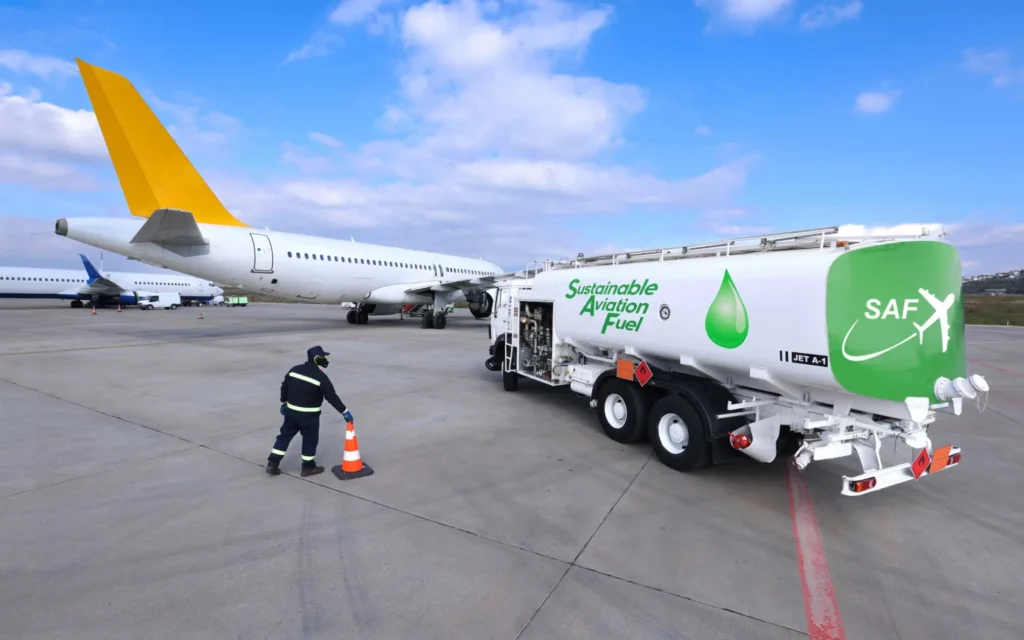
Potential Risks to Sustainable Aviation Fuel Production Highlighted by IATA
IATA emphasizes that policy-related issues might hinder the growth of sustainable aviation fuel (SAF) production which is anticipated to double by 2025.
IATA: Potential Risks to Sustainable Aviation Fuel Production
The International Air Transport Association (IATA) has pointed out that government mandates and policy shortfalls could compromise both the production and adoption of sustainable aviation fuel (SAF) across the globe. This realization came as IATA announced on Sunday, 1st June, that it expects SAF production to reach two million tonnes (Mt) (2.5 billion liters) or 0.7 percent of airlines’ total fuel consumption by 2025.
IATA Director-General Willie Walsh remarked: “While it is encouraging that SAF production is expected to double to two million tonnes in 2025, that is just 0.7 percent of aviation’s total fuel needs, and even that relatively small amount will add $4.4 billion globally to the fuel bill. The pace of progress in ramping up production and achieving efficiencies to reduce costs must accelerate.”
Mandates are part of the problem
Most SAF is now heading toward Europe, where the EU and UK mandates kicked in at the beginning of this year. Regrettably, the cost of SAF to airlines has doubled in Europe due to compliance fees that SAF producers or suppliers are charging. For the expected one million tonnes of SAF that will be purchased to meet the European mandates in 2025, the anticipated cost at current market prices is $1.2 billion. Compliance fees could add an additional $1.7 billion on top of market prices, a sum that could have reduced an extra 3.5 million tonnes of carbon emissions.
Instead of encouraging SAF usage, Europe’s SAF mandates have made SAF five times more expensive than conventional jet fuel. Walsh stated: “This highlights the problem with the implementation of mandates before there are sufficient market conditions and before safeguards are in place against unreasonable market practices that raise the cost of decarbonization. Raising the cost of the energy transition that is already estimated to be an incredible $4.7 trillion should not be the aim or the result of decarbonization policies. Europe needs to recognize that its approach is unproductive and seek alternatives.”
How IATA is supporting the development of the global SAF market
To assist in building a global SAF market, IATA has initiated two programs:
- A SAF registry managed by the Civil Aviation Decarbonization Organization (CADO), which provides a transparent and standardized system for tracking SAF purchases, usage, and associated emissions reductions in compliance with international standards.
- The SAF Matchmaker, designed to facilitate SAF procurement by aligning airline requests for SAF with supply offers.
Actions Needed
IATA urges governments to target three areas:
- Formulating more effective policies to eliminate the disadvantages renewable energy providers face compared to large oil companies, which is essential for scaling renewable energy production and SAF. This includes reallocating a portion of the $1 trillion in subsidies provided for fossil fuels.
- Establishing a comprehensive energy policy approach that incorporates SAF, requiring increased renewable energy production for SAF and ensuring appropriate allocations of renewable energy to SAF.
- Ensuring the success of CORSIA as the sole market-based mechanism to address international aviation’s CO2 emissions. IATA encourages governments to make Eligible Emissions Units (EEUs) available to airlines.
India’s Role in this Context
India, an emerging economy, is the third-largest oil consumer after the US and China. The nation launched the Global Biofuels Alliance to emphasize biofuels as crucial for energy transition and economic growth, aiming for two percent SAF blending for international flights by 2028 with supportive policies.
IATA will work with the Indian Sugar & Bio-Energy Manufacturers Association (ISMA) and Praj Industries Limited to provide guidance on best practices for assessing the lifecycle impact of feedstock use in the country. As the third-largest global civil aviation market, India can enhance its leadership in biofuels through the progressive adoption of SAF.
